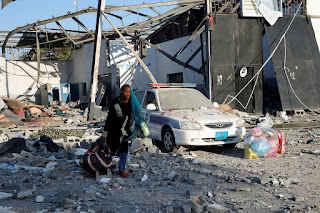An airstrike hit a detention center for mostly African migrants in the Libyan capital late Tuesday night, killing at least 40 and wounding 80, according to Libyan health and government authorities.
The death toll represents the highest single day casualty involving civilians in the nearly three month-long struggle over Tripoli between a renegade eastern commander, Khalifa Hifter, and militias aligned with the U.N.-installed, internationally recognized government.
The attack followed numerous calls in recent months by the United Nations, aid groups and human rights activists to evacuate migrant detentions centers in Libya, many of which are on front lines and near military bases.
The U.N. and human rights groups expressed concern about the attack on Wednesday and reissued calls to evacuate migrants from Libya’s war zones. “Civilians should never be a target,” the U.N. refugee agency, saying they were “extremely” concerned.
The airstrike hit the detention center in the eastern Tajoura enclave of the capital which is located inside a compound that also houses a military camp for forces loyal to the government. Malek Mersek, a spokesman for the government’s emergency medical services, said the death toll was 40, but local media reports suggested it could rise.
Photos published on social media showed the destruction to the center as well ambulances at the scene carrying out migrants. Other photos showed migrants inside a hospital after the airstrike, lying in beds with arms bandaged.
The Tripoli government, in a statement, said that dozens were killed or wounded and blamed Hifter’s warplanes for the attack.
A Hifter spokesman could not be reached immediately for comment.
Ever since the Arab Spring rebellion, with the help from NATO warplanes, ousted Libyan dictator Moammar Gaddafi in 2011, the North African oil producer has been gripped by instability. Militias have sought to grab power and influence, as well as Libya’s vast oil wealth, clashing numerous times in the capital and other cities.
The security vacuum and lawlessness allowed Libya to become a major human smuggling hub and transit point for tens of thousands of migrants trying to reach Europe by boat. European countries, alarmed by the huge influx from Libya, have trained and funded Libya’s coast guard to stop and return them to squalid detention centers, where migrants are often inhumanely mistreated.
The latest surge of violence was triggered by Hifter when he launched a surprise offensive on Tripoli in early April. Dozens of pro-government militias from Tripoli and other cities united to fight the 75-year-old strongman, a dual U.S.-Libyan citizen who was a former general in Gaddafi’s army and lived for years in Northern Virginia. Hifter has aligned himself with a rival government in eastern Libya.
The violence has raised concerns that an Islamic State affiliate, which once ruled the coastal city of Sirte, could take advantage of the chaos and resurrect itself. There is also concern that the conflict could disrupt oil supplies and force more migrants to take the perilous journey in hope of reaching Europe.
Already, a U.N. peace initiative to reconcile the warring sides and bring elections has been derailed by the offensive. Hifter vowed to take the capital within two days. Instead, a military stalemate has emerged with the front line shifting constantly.
Last week, Hifter’s self-described Libyan National Army lost a key base in the city of Gharyan to pro-government forces. This week, his army declared it would use heavy airstrikes against its foes.
The conflict the worst the capital has experienced since 2011 has also become a proxy war fueled by countries breaking a U.N. arms embargo and sending sophisticated weaponry to both sides. Hifter is backed by the United Arab Emirates, Egypt, Saudi Arabia, as well as France and Russia. The Tripoli government is backed by Turkey, Qatar and other Western powers.

No comments:
Post a Comment